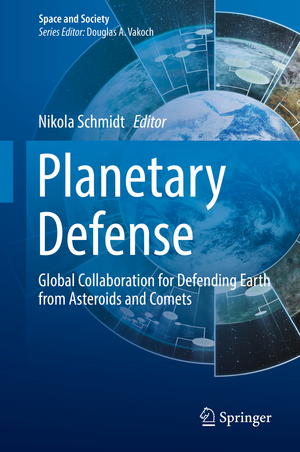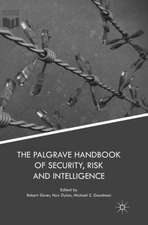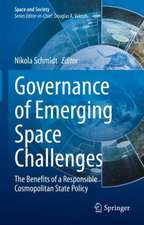Planetary Defense: Global Collaboration for Defending Earth from Asteroids and Comets: Space and Society
Editat de Nikola Schmidten Limba Engleză Hardback – 14 ian 2019
Planetary defense from near-Earth objects such as asteroids is a far more nuanced and challenging topic than it might seem. Each day, technology is making it easier to detect asteroid impact threats in advance, but at present, there is still no easy way to design and implement any form of global defense.
This book examines how various asteroid deflection methods can change global political affairs. The authors believe that the final policy for potential Earth impacts should be based on practical engineering solutions and innovative architectural structures, while at the same time reflecting the most recent political science contributions in ethical security studies and security cosmopolitanism. Their focus is not limited to effective engineering solutions, but rather extends to how such proposals resonate in possible political structures of the future.
Planetary defense cannot be achieved with technology alone; thechapters in this volume highlight the issues that arise when space science and technology intersect with political science. This complex interdisciplinary project not only demands global participation and collaboration, but also proposes the way we can achieve it. The authors explore various concepts of governance and their far-reaching implications for planetary defense and vice versa—how scientific progress in Solar System observations and asteroid collision engineering influence political science and put pressure on the international legal framework.
The text is intentionally written for a diverse scholarly and diplomatic audience in a style accessible to non-specialists and practitioners and can be read by those across diverse disciplinary backgrounds.
Din seria Space and Society
- 20%
 Preț: 692.49 lei
Preț: 692.49 lei - 20%
 Preț: 763.92 lei
Preț: 763.92 lei - 15%
 Preț: 642.68 lei
Preț: 642.68 lei - 15%
 Preț: 643.84 lei
Preț: 643.84 lei -
 Preț: 389.11 lei
Preț: 389.11 lei - 18%
 Preț: 949.90 lei
Preț: 949.90 lei -
 Preț: 385.25 lei
Preț: 385.25 lei - 18%
 Preț: 784.92 lei
Preț: 784.92 lei - 18%
 Preț: 1115.94 lei
Preț: 1115.94 lei - 18%
 Preț: 893.84 lei
Preț: 893.84 lei - 18%
 Preț: 731.91 lei
Preț: 731.91 lei - 18%
 Preț: 1846.28 lei
Preț: 1846.28 lei - 18%
 Preț: 949.73 lei
Preț: 949.73 lei - 18%
 Preț: 897.33 lei
Preț: 897.33 lei - 18%
 Preț: 954.62 lei
Preț: 954.62 lei - 15%
 Preț: 700.75 lei
Preț: 700.75 lei - 24%
 Preț: 719.82 lei
Preț: 719.82 lei - 18%
 Preț: 781.77 lei
Preț: 781.77 lei - 18%
 Preț: 997.88 lei
Preț: 997.88 lei - 18%
 Preț: 725.75 lei
Preț: 725.75 lei - 24%
 Preț: 737.60 lei
Preț: 737.60 lei - 23%
 Preț: 842.19 lei
Preț: 842.19 lei
Preț: 725.96 lei
Preț vechi: 955.22 lei
-24% Nou
Puncte Express: 1089
Preț estimativ în valută:
138.91€ • 145.42$ • 114.94£
138.91€ • 145.42$ • 114.94£
Carte tipărită la comandă
Livrare economică 01-07 aprilie
Preluare comenzi: 021 569.72.76
Specificații
ISBN-13: 9783030009991
ISBN-10: 3030009998
Pagini: 500
Ilustrații: XXXV, 475 p. 93 illus., 88 illus. in color.
Dimensiuni: 155 x 235 x 26 mm
Greutate: 1.13 kg
Ediția:1st ed. 2019
Editura: Springer International Publishing
Colecția Springer
Seria Space and Society
Locul publicării:Cham, Switzerland
ISBN-10: 3030009998
Pagini: 500
Ilustrații: XXXV, 475 p. 93 illus., 88 illus. in color.
Dimensiuni: 155 x 235 x 26 mm
Greutate: 1.13 kg
Ediția:1st ed. 2019
Editura: Springer International Publishing
Colecția Springer
Seria Space and Society
Locul publicării:Cham, Switzerland
Cuprins
Acknowledgements.- Dedication.- Foreword.- Preface.- List of Contributors.- Chapter 1: Introduction: Planetary Defense as the Unique Historical Opportunity to Shape Our Shared Destiny.- Part I: Defining the Threat and Current Efforts.- Chapter 2: The Cosmic Impact Hazard.- Chapter 3: What are NEOs and the Technical Means and Constraints of Solar System Mapping?.- Chapter 4: Methods, Means and Governance of Solar System Observation.- Chapter 5: Technical Architecture to Deepen Our Solar System Awareness.- Chapter 6: Vision of Perfect Observation Capabilities.- Chapter 7: Overview of Asteroid Threat Mitigation Methods.- Chapter 8: NASA NEO Deflection Application: Current Capabilities and Limitations.- Chapter 9: Near-Earth Objects and the United Nations.- Chapter 10: A Consideration of a National Approach: The US Planetary Impact Emergency Response Working Group (PIERWG) A Joint Effort Between NASA and FEMA.- Part II: Thinking About the Risk, Responding to the Threat and the International Dynamics.- Chapter 11: Evolution of Security Studies and the Resulting Perspectives of an Asteroid Threat.- Chapter 12: Asteroid Impact Risk Assessment: Rationalizing the Threat.- Chapter 13: Uncertainty and Risk at the Catastrophe Threshold.- Chapter 14: Conceptualizing the Asteroid Threat and Searching for a Balanced Answer Between Effectiveness and Desirability.- Chapter 15: Weapons of Mass Protection? Rogue Asteroids, Nuclear Explosions in Space, and the Norms of Global Nuclear Order.- Chapter 16: Dilemmas for Planetary Defense Posed by the Current International Law Framework.- Chapter 17: ‘No Conscience of its Own:’ The Need for Global Space Ethics Review.- Chapter 18: The Conundrum of Commercial Space.- Part III: The Architecture of Global Collaboration on Planetary Defense.- Chapter 19: The Overview Effect and Planetary Defense.- Chapter 20: Cosmopolitan Rationale for Planetary Defense.- Chapter 21: Dawn of Cosmopolitan Order? The New Norm of Responsibility to Defend Earth And the Planetary Council.- Chapter 22: Global Space Governance Mechanisms and Planetary Defense Mechanisms.- Chapter 23: New Enemy, Old Pact? Past Defense Pacts and Future Planetary Defense Treaty.- Chapter 24: Why a World State is Unavoidable in Planetary Defense: On Loopholes in the Vision of a Cosmopolitan Governance.- Chapter 25: The Moon Base as a Commercial Hub.- Chapter 26: The Multipurpose Lunar Base as a First-Line Biosphere Defense and as a Gateway to the Universe.- Chapter 27: Will Planetary Defense Change a Realist World?.- Index.
Notă biografică
Dr. Nikola Schmidt (born 1982 in Prague, Czech Republic) is currently a leader of Planetary Defense project with an objective to deliver a policy strategy on planetary defense and asteroid mining for the Czech Ministry of Transport. The project consists of astronomers, space engineers, international lawyers and political scientists. He finished his PhD in 2016 at Charles University, Faculty of Social Sciences and Institute of Political Studies with a dissertation on The Birth of Cyber as a National Security Agenda. Nikola has been extensively teaching courses on space and cyber security at various Czech universities. His passion in space issues can be dated long before his master studies of international relations at Metropolitan University. A pivotal moment for Nikola was his participation in the ESA and NASA-funded planetary defense team project at the Space Studies Program, organized by the International Space University in Athens, Ohio, US in 2015. Nikola received a bachelor’s degree in sociology and studied international security at Sciences Po in Paris. His recent articles were published in Acta Astronautica and New Space. Nikola founded and led two software development companies before coming back to academia and worked on a NGO-driven food facility project in Afghanistan.
Textul de pe ultima copertă
Planetary defense from near-Earth objects such as asteroids is a far more nuanced and challenging topic than it might seem. Each day, technology is making it easier to detect asteroid impact threats in advance, but at present, there is still no easy way to design and implement any form of global defense.
This book examines how various asteroid deflection methods can change global political affairs. The authors believe that the final policy for potential Earth impacts should be based on practical engineering solutions and innovative architectural structures, while at the same time reflecting the most recent political science contributions in ethical security studies and security cosmopolitanism. Their focus is not limited to effective engineering solutions, but rather extends to how such proposals resonate in possible political structures of the future.
Planetary defense cannot be achieved with technology alone; the chapters in this volume highlight the issues that arise when space science and technology intersect with political science. This complex interdisciplinary project not only demands global participation and collaboration, but also proposes the way we can achieve it. The authors explore various concepts of governance and their far-reaching implications for planetary defense and vice versa—how scientific progress in Solar System observations and asteroid collision engineering influence political science and put pressure on the international legal framework.
The text is intentionally written for a diverse scholarly and diplomatic audience in a style accessible to non-specialists and practitioners and can be read by those across diverse disciplinary backgrounds.
Caracteristici
Explores the political feasibility of planetary defense Provides a comparison and assessment of available political models regarding planetary defense Suggests a complex policy, as well as engineering and architectural solutions to building a strong planetary defense

























